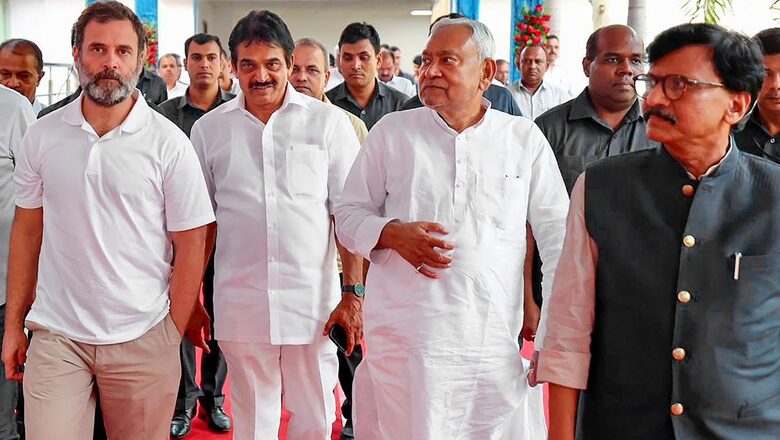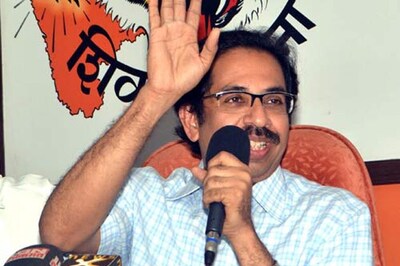
views
The tremors had been felt for months, a quiet rumble beneath the surface of Indian politics. But when Nitish Kumar, the enigmatic chief minister of Bihar, took a decisive step back from the INDIA front, the earth beneath the opposition movement truly cracked open. What was once a meticulously constructed edifice, a united front against the behemoth of the BJP, now lies in scattered fragments, exposed to the harsh winds of political reality. This implosion is not just a tactical retreat; it’s a stark revelation of the rot within, a symptom of a disease that festers at the heart of the opposition: the Congress party and its dynastic legacy.
To point fingers at Nitish Kumar’s ambition is a convenient narrative, a scapegoating exercise that masks the deeper culpability. Years of infighting within the Congress, the spectre of centralised control under the Gandhi family, and an inability to articulate a compelling vision have left regional allies disillusioned and vulnerable. The INDIA bloc, conceived as a beacon of hope, withered under the weight of unfulfilled promises and a lack of clear leadership. While the BJP, under Narendra Modi’s iron grip, marches resolutely towards a centralised vision, the opposition remains entangled in a quagmire of indecision and self-preservation.
Delaying tactics in Congress
In the intricate dance of political alliances, the Congress’s recent manoeuvres have left many scratching their heads. Despite joining forces with opposition parties, their delaying tactics have only added fuel to the fire of discord within the coalition. As the state assembly elections loomed late last year, the Congress opted to procrastinate on crucial discussions within the alliance, a move that backfired spectacularly when it faced a resounding defeat in Rajasthan, Chhattisgarh, and Madhya Pradesh. Only then did the party scramble to revive talks, but the damage had been done. This series of fumbles by the Congress undermined its position and dealt a blow to regional players counting on a unified front against the ruling party. It’s a textbook case of self-sabotage in the political arena.
Attempting to shift blame onto others, particularly regarding Nitish Kumar’s departure, only further exposes the disarray within the opposition ranks. Offering him a leadership role in the alliance while simultaneously failing to provide the cohesion necessary to retain him smacks of a strategic miscalculation. In the court of public opinion, televised debates and discussions have laid bare the truth: the opposition alliance failed to muster the unity required to retain key players. The Congress cannot absolve itself of responsibility in this debacle. For a party aiming to lead a united front against the ruling government, such missteps are not just setbacks but strategic blunders with far-reaching consequences. In the unforgiving arena of politics, timing and cohesion are everything, and the Congress must learn from its mistakes if it hopes to regain lost ground and present a formidable challenge in future elections.
Lack of understanding of ground realities
The party, consumed by internal factions and power struggles, has failed to adapt to the changing political landscape, clinging to a fading image of itself while the ground beneath it shifted. This implosion is not just a political setback; it’s a blow to the very foundations of Indian democracy. A vibrant, functioning opposition is the lifeblood of any healthy democracy, serving as a check and balance and a voice of dissent against the tide of power. With the INDIA bloc in tatters, the BJP stares across a barren political landscape, its dominance seemingly unchallenged. This is not an environment conducive to healthy debate, diverse perspectives, or the protection of individual rights. It is a recipe for complacency, unchecked power, and a democracy teetering on the edge of a one-party state. But there is, perhaps, a sliver of hope amid the wreckage. Nitish Kumar’s defection can be seen as a wake-up call, a harsh but necessary nudge towards introspection and course correction.
Rahul Gandhi-centric affair and ignoring opposition leaders
Long before Nitish Kumar’s dramatic exit, murmurs of disquiet echoed through the opposition alliance. Mamata Banerjee, the firebrand chief minister of West Bengal and once a Congress ally, was one of the first to sound the alarm. Her stinging criticism of the Congress’s “discouraging behaviour” towards regional leaders resonated across the political landscape. The dissonance was stark. While the Gandhis embarked on their Bharat Jodo Yatra, a grand march ostensibly designed to unite the opposition, their West Bengal unit, led by Rahul Gandhi confidante Adhir Ranjan Chowdhury, was locked in open hostility with Banerjee. This disparity in approach—national grandeur versus state-level discord—epitomised the communication gap plaguing the alliance.
Leaders like Banerjee, Kumar, Arvind Kejriwal and Bhagwant Mann represent crucial forces within the opposition tent. Yet, the Congress often seemed fixated on its internal narrative, with Rahul Gandhi taking centre stage. His yatra, traversing opposition-ruled states, felt less like a collective crusade and more like a Congress spectacle—one to which regional allies weren’t cordially invited. This perceived imbalance bred resentment. Unlike Gandhi, for whom national losses are setbacks, not existential threats, regional leaders face the stark reality of wiped-out state elections obliterating their political careers. Their desperation is understandable, and the Congress’s apparent disregard for their anxieties fueled the flames of discontent. Nitish Kumar’s defection was merely the last brick falling from the already crumbling wall. The foundation, eroded by mistrust, poor communication, and a top-down approach, could no longer sustain the weight of a diverse opposition.
The Congress must now face a harsh reality: its dynastic baggage and inward focus are crippling the very alliance it desperately needs. To truly stand against the BJP, it must shed this self-centred approach and embrace genuine collaboration. Regional leaders deserve respect, not relegation to the chorus line of a one-man show.
The opposition’s babel needs a translator, not a conductor. True unity demands shared platforms, open communication, and an acknowledgement that the fight against the BJP requires more than just one family’s spotlight. Only then can the opposition hope to rebuild the tower of its dreams, stronger than before, on a foundation of trust and shared purpose.
Lost momentum of opposition
The Ayodhya Ram temple inauguration handed the BJP a golden moment, while the opposition stumbled with fractured leadership. Nitish Kumar’s U-turn exposes a stark reality: they’ve let momentum slip through their fingers. Fighting Modi in 2024 on just development, Hindutva, welfare, and nationalism will be like climbing Mount Everest in flip-flops. The opposition lacks a compelling narrative, a counterpoint to the BJP’s carefully crafted tapestry. Their sole advantage, the “united front” optics, has vanished, replaced by a fragmented tableau. Unity may not win elections, but fragmentation hands victory on a silver platter.
To truly challenge the BJP, the opposition needs more than just Rahul Gandhi’s Bharat Jodo Nyay Yatra. They need a shared vision, a narrative that resonates beyond their echo chambers, and leaders who inspire not just dissent but hope. Otherwise, 2024 may see them relegated to the sidelines, watching the BJP’s victory march unfold.
Way forward
Damage control is tough, but it should start first with a humbling acceptance of responsibility. The narrative of victimhood, of being unfairly targeted by Modi and the BJP, must be abandoned. Instead, the party must look inwards, at its organisational weaknesses, its leadership vacuum and its disconnect from the aspirations of the people.
Secondly, the Congress must loosen its grip, both literally and figuratively. The suffocating control exerted by the Gandhi family must be relaxed, allowing for the emergence of new voices, fresh ideas, and regional leaders who can connect with the diverse realities of India. The party must become a platform, not a pedestal, a facilitator of collective action, and not a dispenser of dynastic entitlements. Finally, and most importantly, the Congress must rediscover its purpose. In its quest for power, it has lost sight of the ideals that once defined it. It must re-articulate its vision for India, a vision that goes beyond mere anti-BJPism. It must speak to the anxieties of the youth, the concerns of the marginalised, and the aspirations of the middle class. It must offer a compelling alternative—a future built on social justice, economic equality, and environmental sustainability.
The road ahead is long and arduous. The damage done is significant; the trust was fractured. But within the ruins of the INDIA bloc lies an opportunity—a chance to rise from the ashes and build anew. The Congress and the Gandhis have a choice to make: remain prisoners of their past, clinging to a fading relevance, or embrace the mantle of change and chart a new course for Indian democracy. The clock is ticking, and the future of India’s opposition, indeed the future of Indian democracy itself, hangs in the balance. Their decision will echo through the corridors of power, shaping the narrative of a nation for years to come.
The author teaches journalism at St Xavier’s College (autonomous), Kolkata, and he is a political columnist. He posts on X at @sayantan_gh. Views expressed in the above piece are personal and solely those of the author. They do not necessarily reflect News18’s views.




















Comments
0 comment